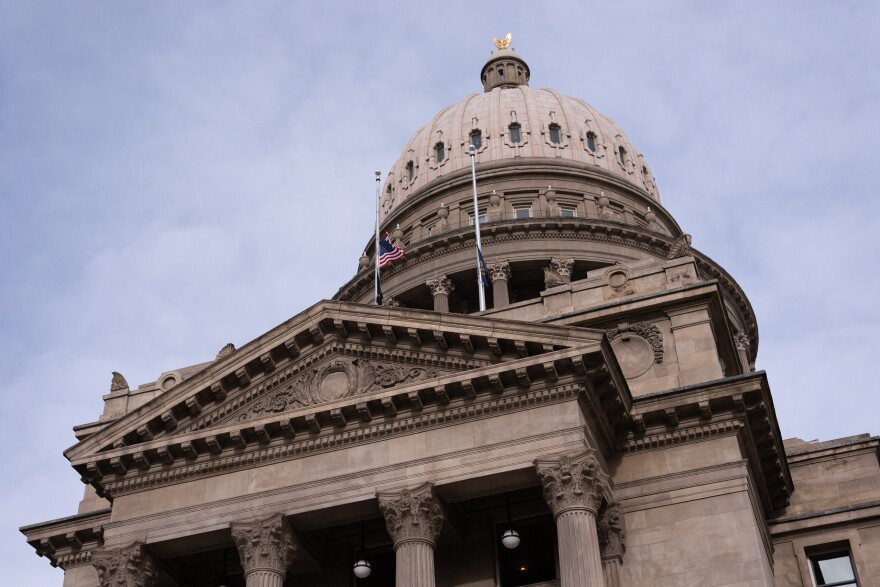After an acrimonious, 95-day session marred by political infighting and, at times, daily protests, Idaho lawmakers have left Boise. Much of the last three months at the Idaho legislature have focused on hot button issues – Medicaid expansion, ballot initiatives and hemp.
Towards the end, the days were marked by hours-long backroom negotiations among House Republican leaders.
They were intent on adding work requirements for people who can soon get health care under the state’s voter-approved Medicaid expansion. They also wanted to tighten up Idaho’s ballot initiative laws to make them among the most restrictive in the country.
Despite intense public pushback, Republicans forced them through both the House and Senate.
Jason Monks (R-Nampa), the House’s Assistant Majority Leader, insists they did listen to hours upon hours of public testimony against these proposals.
“We’re trying to make sure that we’re listening to the people when we can. We’re making those decisions when we think they’re important for us and I thought we did a fantastic job of taking the input that we received, making adjustments, course corrections, and moving forward with that,” Monks says.

They did backpedal a bit on both the initiative restrictions proposal and mandatory work requirements for Medicaid to lock down enough votes for them to pass both chambers.
Gov. Brad Little (R) eventually vetoed the initiatives bills but signed off on the Medicaid tweaks.
Several Republicans, like Rep. Megan Blanksma (R-Hammett), say the voices against these proposals aren’t the same ones they hear from back home.
“We do listen to input, but the whole idea is that each of us is from a different district with very different needs and just because it’s said in the auditorium in Boise, in Ada County, doesn’t necessarily reflect the feelings of the greater part of the state,” Blanksma says.
Her rural district spans Elmore and Owyhee counties, plus part of Twin Falls County. She acknowledges her constituents did vote 55% in favor of expanding Medicaid last November.
“But there are also voices in my district that were very frustrated with that approval and I think that you don’t want to discount the voices that are in the minority on that vote.”
That kind of response angered a lot of people who came to testify at hearings over the past few months – no matter how many people took a stand against these bills, it didn’t seem to matter to dead set legislators.

“I cannot remember a session that did more damage to the faith of people in their government or that was so consistently marked by the Republican majority’s total disregard for the will of the people of Idaho,” said House Assistant Minority Leader Ilana Rubel (D-Boise).
Hearings on bills where the bulk of testimony was initially blocked, hastily called committee meetings with little notice and bills quickly amended without public testimony – all of it, Rubel said, added up.
To cap it all off, House and Senate Republicans squared off in a staring contest over what’s historically been a rubber-stamped bill to renew more than 8,000 pages of administrative rules.
The House won and left town, leaving all of these rules to expire July 1.
“This is kind of a first,” Rubel says. “I have no recollection of this body ever just leaving and dropping the ball on something so major that’s such a core part of our obligations.”
Governor Little says he’ll revive all those rules before they expire. But that sets up a bitter fight next year to make all of them permanent again.
Jasper LiCalzi is the chair of College of Idaho’s Department of Political Economy. He characterized this year’s session as a heavyweight boxing match between the House and Senate.
“This was like the first round and both sides are kind of like feeling each other out, just saying, ‘Ok, well how much can I get away with here?’”

LiCalzi says he saw a lack of leadership from Republican legislative chiefs. “The cats were all roaming all over the place and nobody was keeping them together.”
That criticism went all the way to the top, too. LiCalzi says he would’ve liked to have seen Governor Little be more assertive this past session.
“You have a lot of issues out there that are splitting the legislature and the public and he doesn’t really make any really forceful stands on this.”
Little says LiCalzi is entitled to his own opinion. But he points to what he views as successes over the past few months: giving teachers a raise, putting more money toward literacy and setting state government up to cut regulations.
“Anybody from almost any other state would kill to have this kind of results. Talk to other states, look at the federal government, look at the confidence at the federal level. Look at what we’re doing in the most important thing we do in Idaho, in education,” Little said.
During his inaugural address, Little said, “The most sacred duty of elected officials is to uphold the trust citizens have granted us.” Activists and critics have already called this promise into question, which could set up an even more contentious legislative session and 2020 election.
Follow James Dawson on Twitter @RadioDawson for more local news.
Copyright 2019 Boise State Public Radio



